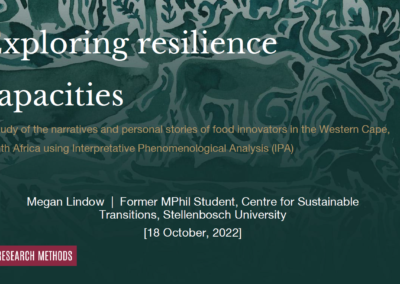This page deals with the set of methods related to qualitative content analysis, which seeks to find and examine patterns of sense- and meaning-making in the communicative characteristics of language, by focusing on the content and underlying themes and meaning that emerge in a text. The content on this page discusses discourse analysis, critical discourse analysis, thematic analysis, narrative analysis, critical narrative analysis and interpretative phenomenological analysis.
The Chapter summary video gives a brief introduction and summary of this group of methods, what SES problems/questions they are useful for, and key resources needed to conduct the methods. The methods video/s introduce specific methods, including their origin and broad purpose, what SES problems/questions the specific method is useful for, examples of the method in use and key resources needed. The Case Studies demonstrate the method in action in more detail, including an introduction to the context and issue, how the method was used, the outcomes of the process and the challenges of implementing the method. The labs/activities give an example of a teaching activity relating to this group of methods, including the objectives of the activity, resources needed, steps to follow and outcomes/evaluation options.
More details can be found in Chapter 19 of the Routledge Handbook of Research Methods for Social-Ecological Systems.
Chapter summary:
Method Summaries
Case Studies

SLIDES: Exploring Resilience Capacities: A study of the narratives and personal stories of food innovators in the Western Cape, South Africa using Interpretative Phenomenological Analysis (IPA)
Lindow, M., Preiser, R. & Biggs, R. (2022)
Exploring Resilience Capacities: A study of the narratives and personal stories of food innovators in the Western Cape, South Africa using Interpretative Phenomenological Analysis (IPA)
Lindow, M., Preiser, R. & Biggs, R. (2022)
Lab teaching/ activity
Tips and Tricks
- Bryman, A. 2016. ‘Language in Qualitative Research.’ In Social Research Methods (5th ed), 525–544. Oxford: Oxford University Press.
- Dryzek, J. 1997. The Politics of the Earth: Environmental Discourses. Oxford: Oxford University Press.
- Fairclough, N. 2003. Analysing Discourse: Textual Analysis for Social Research. London: Routledge.
- Hajer, M.A., M. van den Brink, M., and T. Metz. 2006. ‘Doing Discourse Analysis: Coalitions, Practices, Meaning.’ In Words Matter on Policy and Planning: Discourse Theory and Method in the Social Sciences, edited by M. Brink and T. Metze, 65–74. Utrecht: Koninklijk Nederlands Aardrijkskundig Genootschap. http://hdl.handle.net/11245/1.289572.
- Weiss G., and R. Wodak. 2003. ‘Introduction: Theory, Interdisciplinarity and Critical Discourse Analysis.’ In Critical Discourse Analysis, edited by G. Weiss and R. Wodak, 1–32. London: Palgrave Macm il lan. https://doi.org/10.1057/9780230514560_1
